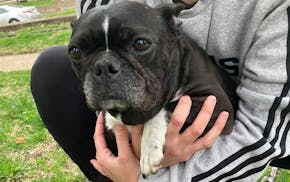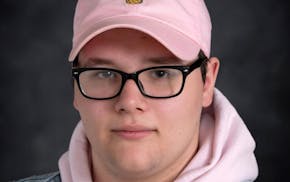As a landmark election unfolds an ocean away, Minnesota's vast Liberian community has sprung into action, throwing support behind candidates and working to sway family members' votes. Calls home buzz with chatter about Tuesday's presidential runoff, which pits Joseph Boakai, the current vice president, against George Weah, a retired soccer icon.
Hopes are high that this race will mark the first peaceful transfer of power from one elected president to another in decades, a critical test of the country's democracy after a lengthy period of civil war came to an end in 2003.
For months, Minnesotans have been making their voices heard on social media and beyond, and wooing relatives to vote for their preferred candidates. Some have even flown back to Liberia to door-knock and watch the election action firsthand.
"Minnesota is just not an observer or a sideline cheering squad," said Abdullah Kiatamba, a Liberian community leader and executive director of the nonprofit African Immigrant Services. "Minnesota is shaping and influencing things."
Eager to get involved, members of the area's large Liberian community are writing and sharing opinion pieces, planning watch parties and linking up with local offshoots of Liberian political parties with active presences in Minnesota.
"People are literally living in two worlds around this election," said Kiatamba, who is personally backing Weah. "People are involved here as much as people on the ground."
Community leaders say more than 30,000 people of Liberian descent live in Minnesota, with many concentrated in the northwest metro. They often describe Minnesota as home to the most Liberians outside Liberia.
The community's size makes Minnesota "strategic ground" during elections, said Duannah Siryon, who's involved with the Coalition for Democratic Change campaign, the political party of candidate Weah.
Major candidates commonly pay visits to the North Star State, eager to test their messages and build crucial support from a population that has strong financial pull with relatives still living in Liberia. Both presidential hopefuls have made Minnesota appearances, Liberian community leaders say.
"You cannot successfully win elections in Liberia without huge support from the diaspora community," said Wynfred Russell of African Career, Education and Resource Inc., a metro-area nonprofit.
The diaspora, Russell said, wields significant economic power and influence, often sending regular financial support to family members back in Liberia.
"People will say openly, 'Look, if you don't support my candidate, you can rest assured I'm not going to send you money for Christmas.' Folks will oblige," Russell said. "Proverbially, you cannot bite the hand that feeds you."
'A new beginning'
Since October, Al-Hussein Fadiga has taken to the airwaves in Brooklyn Park to spread the word about the race and promote his preferred candidate, Vice President Boakai.
His online radio station, Radio Africa, attracts thousands of Liberian listeners across the globe. He runs the program with his brother, Hassan Fadiga. Al-Hussein Fadiga said the ability to share information online has been revolutionary in this year's race.
"Social media has been a game-changer," Fadiga said. "A lot of Liberians see this election as a new beginning."
Some north metro residents, like Erasmus Tiampa Williams, have taken political action beyond computer screens, traveling to Liberia to campaign in person. A few months ago, Williams went from village to village and town to town to advocate for his chosen candidate, Boakai.
He said common concerns emerged on the campaign trail.
"People want change but also stability," said Williams, who's also the national vice chairman of the Unity Party in America and Canada, Boakai's political party. "No one wants the country to return to war."
Observers say the election so far has been peaceful, with Liberians around the world waiting to see if peace holds once the race is decided.
The first round of the presidential election took place in October without a candidate winning a majority, prompting Tuesday's runoff between the top two finishers. The winner will take over for Ellen Johnson Sirleaf, Africa's first democratically elected female head of state and a winner of the Nobel Peace Prize.
Attention now turns to the election results, which are expected to be certified in the coming days. Many say the closely watched outcome means as much in Minnesota as anywhere in the world.
"That's our country, regardless," said 26-year-old Alfreda Daniels, a Brooklyn Park resident whose family is in Liberia. "I would like to see Liberia turn around and be the country I know it can be."
Hannah Covington • 612-673-4751
Mother charged with fentanyl overdose death of her 8-month-old boy in Roseville hotel room

Dog returned safely to woman who had 'Tiny' stolen from her while on a walk in St. Paul 2 days ago

Prairie Island Indian Community requests the return of 'Mankato Hanging Rope'
